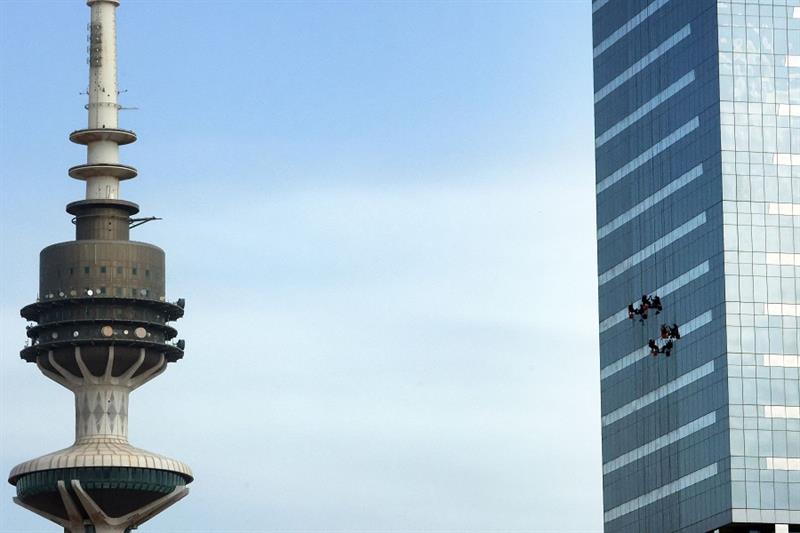
File photo: Workers clean the windows of a building near the Liberation Tower, in Kuwait City on March 19, 2023. AFP
Despite its large oil reserves, Kuwaits hospitals and educational services are falling through as the wealthy Gulf region's only fully elected parliament struggles.
Ahmed al-Sarraf, a businessman and newspaper columnist, says his concerns are growing as the country falters.
"I feel great anxiety for my family, for the future of my grandchildren, for their education, and for my health," the former banker told AFP.
"This situation is generating great misery."
Kuwait, which borders Saudi Arabia and Iraq, is home to seven percent of the world's crude reserves. It has little debt and one of the strongest sovereign wealth funds worldwide.
However, it suffers from constant stand-offs between elected lawmakers and cabinets making it difficult to pass necessary reforms to diversify the economy. While repeated budget deficits and low foreign investment have added to the air of gloom.
The latest twist came last month, when the constitutional court dissolved an opposition-controlled assembly over alleged electoral irregularities and reinstated the previous parliament.
"Political dysfunction"
Kuwait's parliament has now been dissolved around a dozen times in its 61-year history.
In January, Kuwait's government resigned three months after it was sworn in due to disputes with lawmakers. It was the sixth government in just three years.
Kuwait's neighbours the UAE, Saudi Arabia and Qatar have managed to transform their desert nations into booming modern metropolises, largely thanks to oil wealth and foreign investment.
Led by a new generation of rulers, they are stepping up projects to wean their hydrocarbon-centred economies away from oil.
Meanwhile Kuwait, led by 82-year-old Crown Prince Mishal al-Ahmad al-Jaber Al-Sabah, is struggling to implement a reform plan adopted in 2018.
"We were a liberal and innovative country in the 1980s... but we died out while the countries around us developed," the businessman Sarraf said.
According to economist Justin Alexander, "political dysfunction" has kept Kuwait from living up to its full economic potential.
The paralysis "has prevented it from taking painful reforms to control spending growth, generate non-oil revenue, diversify its economy or even invest to maintain its oil production capacity," the Gulf expert said.
Kuwait, which posted large deficits during the Covid-19 pandemic, was buoyed last year by the rise in oil prices, which generate most of the state's income.
But as prices stabilise, the country's budget deficit is expected to widen.
Short link: